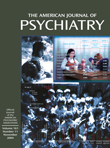To the Editor: Lynn E. DeLisi, M.D., et al.
(1) reported a most interesting account of the reaction of New Yorkers to the events of Sept. 11, 2001, 3–6 months later. We wish to highlight one important finding they made, the higher risk faced by persons with psychiatric disorders when exposed to major terrorist events. The authors found that 63 individuals who were in previous psychiatric treatment, of the 1,009 adults that were interviewed, had significantly greater mean scores on the Davidson Trauma Scale. Earlier, also with regard to the events of September 11, Hoge and Pavlin
(2) noted that based on behavioral health surveillance among military health system beneficiaries in the Washington, D.C., area, they found no increase in visits to behavioral health clinics in the 22 weeks between Sept. 11, 2001, and Feb. 9, 2002, compared with a similar period 2 years earlier.
We explored selected health indicators on the effect of the El-Aqsa intifada on the residents of Jerusalem. Our city had been subjected to no less than five major terrorist events during the period October 2001 to December 2002 (the period we explored, although the intifada continues). One of the indicators we wish to report is the number of visits to governmental psychiatric outpatient clinics in the city. These well-staffed clinics provide free treatment and are located in different places in the city. Referrals are not required, and users could walk in according to their needs. We looked into the visits of users belonging to three age groups with regard to the following categories: 1) those who were new to the system, 2) those who returned to the clinic after at least a 5-year break, and 3) visits by patients under care.
We used time series analysis to study the data, taking into account inherent ongoing trends within the system. The results showed that there was a statistically significant increase in visits by patients who were under care, both adults and elderly, although there were no changes among the two other groups.
Our results appear to confirm both reports
(1,
2). Breslau
(3), among others, found that persons in psychiatric care are more vulnerable to major stressful events, such as those generated by terrorism. Ursano, quoted by Stephenson
(4), alerted planners and administrators about the risk of taking away mental health personnel from the care of patients in order to address other possible terrorism-related mental health problems. In a forthcoming report, we will show the burden of care in other services of Jerusalem other than psychiatric.

